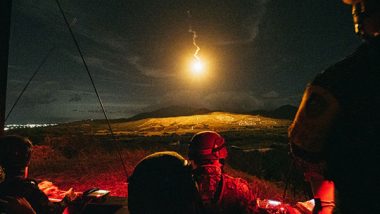Hong Kong, December 16 (ANI): There was a surge in coercive drills by China's military and maritime law enforcement agencies around Taiwan from December 9-11, the largest such activities since the 1996 Taiwan Strait Crisis. They represented Beijing's protest against Taiwanese President Lai Cheng-te's transit through Hawaii and Guam.Spanning a larger geographic area than previous exercises, the unannounced drills entailed some 90 Chinese naval and coast guard vessels, as well as dozens of aircraft.
Interestingly, People's Liberation Army Navy (PLAN) ships formed two "walls" east of Taiwan to restrict entry into the First Island Chain, whilst other PLA aircraft and ships encircled Taiwan. Simultaneously, PLA aircraft simulated driving away and attacking foreign ships and aircraft. Indeed, the main feature of this exercise was an intent to prevent foreign powers from interfering in its coercion of Taiwan.One Taiwanese official described it as "total military intimidation" and an effort to control waters within the "inner part of the island chain". Unlike previous occasions, China did not preannounce the exercise, likely an attempt to play mind games against Taiwan as Beijing escalates against Lai's government.
Eventually providing a belated explanation for the wargames, Chinese Ministry of National Defense (MND) spokesperson Senior Colonel Wu Qian said on December 13 that "it's the PLA's lofty mission to protect national sovereignty and territorial integrity, safeguard the fundamental interests of the Chinese nation, and defend the shared interests of compatriots on both sides of the strait".Wu cryptically added, "As water has no constant form, there are in warfare no constant conditions. The PLA will decide whether and when to conduct military exercises in accordance with the needs and the situation on the ground." In other words, it offered no rationale for its military activities, although they were entirely expected by Taiwan.
Wu further warned, "Whether there's a military exercise or not, the PLA will never be absent or hesitant in fighting 'Taiwan independence' and promoting national reunification. Any attempt to split the nation through soliciting external support or resorting to force will be punished and doomed to fail." Of course, communist China and Taiwan have historically never been on the same side, so the two are already two splitnations.
Chinese actions caused the Taiwanese government to set up an emergency operations center on December 9 to monitor PLA activities. Taipei criticized Beijing's heavy-handed modus operandi, saying, "China's long-term goal of deterring regional parties and disrupting the rule-based international order will not be endorsed by the international community."
This major exercise followed a previous one in October that warned against "separatist acts". The MND said, "The Chinese PLA will keep on strengthening war-preparedness training and resolutely foil any separatist attempts to seek Taiwan independence and interference by external forces."
On December 12, China's Foreign Ministry said the attempt by Taiwan's ruling Democratic Progressive Party's (DPP) secession attempt to seek "Taiwan independence" is doomed to fail. Of course, Beijing is couching its invective in blatant falsehoods, for the DPP is not declaring independence but simply maintaining the status quo.
China's arguments are predicated upon the DPP being the main culprit, asserting that its policies are bringing trouble upon Taiwanese heads. In fact, it is not Taiwan or the USA provoking China, but rather the latter is wholly responsible for ratcheting up tensions.
Foreign Ministry spokesperson Mao Ning said, "I'd like to reiterate that there's only one China in the world, and Taiwan is an inalienable part of China," which is again a deceit not backed up by facts. The world needs to recognize that the Chinese Communist Party (CCP) deliberately distorts history and bullies others. The 24 million citizens of Taiwan, and not the CCP, have the right to decide their future.
China waxes eloquent about kindred ties between China and Taiwan, the unity of "sons and daughters of China". However, the party also stokes nationalistic fervor at home to solidify CCP legitimacy. Unsurprisingly, there is no appetite for an independence declaration within Taiwan, since the people take seriously China's threats of military action if it did so. Yet the CCP has painted itself into a corner with its threats, because to not follow through would destroy its credibility with the Chinese populace.
There is much debate over whether China would dare to invade Taiwan, and when it is most likely to do so. In June, Rear Admiral Mike Studeman, former commander of the US Office of Naval Intelligence, appeared on the "Why Should We Care about the Indo-Pacific?" podcast. Studeman noted, "It's very clear that Xi Jinping wants to have Taiwan options earlier than the mid-2030s. He has been preparing his people, his military, his officials, his population for recovering Taiwan."
He also said Xi is very open about his intentions. "He accelerated some modernization goals from 2035 to 2027. It also happens to be the centenary of the PLA, a hundred years since they were established." Further, "He's done a number of things to prepare for putting his country into a wartime environment. The military, the governmental, the leadership, economic...all of these indicators of preparation indicate a very serious country that's sprinting towards trying to do something that their leader is telling them that they must do."
Studeman warned, "History is rhyming a lot, and we'd be wise to take Xi at his word." Indeed, referring to the USA, he said, "We need to take it seriously and not be naive about what our adversary's intentions may be. I believe that you can, in fact, achieve deterrence- if you're very good at deterrence. But I think it's eroding and we have more to do."
The former Admiral described deterrence as a comprehensive problem for the USA that extends beyond military capability. "Otherwise we're fated to actually see this thing transpire and the whole world will be a loser from it." It involves developing a network of countries to resist Chinese aggression, since the whole world's economy would suffer from any Taiwan invasion. Studeman quoted a figure of perhaps USD 10 trillion, or 10 per cent of global GDP, being lost due to reckless Chinese acts.
One thing delaying Chinese intentions is that the PLA continues to be wracked by scandals and corruption. Studeman therefore noted, "Today, Xi Jinping feels like the PLA isn't quite ready. How do we convince him that, in fact, they won't be ready three years from now, five years from now, seven years, nine years, et cetera? And so this is something we have to do."
Further thoughts on deterring China from attacking Taiwan came from Charles Parton in a primer entitled "Taiwan Invasion Is Not Likely, but Deterrence Remains Vital", published by the UK-based Council on Geostrategy. Parton declared that deterrence is the single-most important action to prevent Chinese attempts to conquer Taiwan.
Incidentally, deterrence is the best strategy for other countries facing tensions with China, such as India and the Philippines, too.Parton said, "Hitherto the emphasis has been on military deterrence. It has its place. Largely, military deterrence is a US responsibility: European forces are unlikely to be available in sufficient time or numbers. Nevertheless, other free and open countries should be willing to help Taiwan improve its 'porcupine defense', if they have the capability and if the Taiwanese request specific help. That would include training."Economic impacts are an important deterrent too. The CCP needs to know, well in advance, that forceful unification will lead to sanctions and embargoes. "Warning should be given quietly but with conviction, and in the near future." Economic deterrence needs to be believable too. "In the event of invasion or forceful unification, the clamor for sanctions will prove irresistible. Governments need to recognize this now and persuade the CCP of the inevitable."
With China's economy already declining and social discontent rising, war would exacerbate instability. Amidst weak domestic consumption, exports are a pillar of China's economy. War would decimate these exports. Approximately 30 per cent of world trade passes through the South China Sea, and Chinese, Japanese and South Korean markets would be immediately impacted. Beijing must also consider food and energy security.
For example, despite attempts to diversify sources, 80 per cent of China's oil imports sail through the Malacca and Sunda Straits, which are easily blockaded.
Parton believes the specter of economic disaster should encourage Beijing to desist from any Taiwan invasion. After all, regime survival is the CCP's paramount aim. In 1989, the party faced the risk of being toppled as the public took to the streets. Is it willing to face the same prospect all over again? "That look over the precipice is scarred on its memory. It will not want a second look," Parton assessed.
As for military deterrence, an invasion of Taiwan is inherently risky. Consider the difficulties Russia has experienced in its invasion of Ukraine across a shared land border. The PLA's challenges would be considerably greater given that forces need to cross the rough, 100-nautical-mile-wide waters of the Taiwan Strait. Seaborne invasions are dangerous and bloody, and Taiwan has just 14 beaches able to accommodate amphibious landings. Taiwan also has mountainous topography, which favors the defender.
Additionally, Taiwan's military is strengthening asymmetric capabilities, so-called "porcupine defenses", to strike the PLA where it hurts most. Beijing must also be wary of the USA coming to Taiwan's defence.
In a separate report, this time from the RAND Corporation and entitled "Can Taiwan Resist a Large-Scale Military Attack by China? Assessing Strengths and Vulnerabilities in a Potential Conflict", the authors considered scenarios such as a Chinese conventional missile attack, joint blockade campaign, amphibious invasion and extensive information operations.
The authors reached several pertinent conclusions, one being that the quality of Taiwan's civilian leadership is paramount. "First, for insight into Taiwan's capacity to resist an attack, analysts should pay close attention to the quality and strength of the island's political leadership and the degree of social cohesion in the lead-up to a crisis or conflict. The state of the Taiwan military and the island's enduring vulnerabilities should be regarded as of secondary importance."
Turning to the quality of Taiwan's armed forces, the RAND report noted, "Second, Taiwan's disadvantage in the quantity of armaments and troops does not doom it to defeat. Taiwan can take important steps to improve the effectiveness of its military. However, even if Taiwan's military dramatically improves its combat effectiveness, China's military advantage will likely continue to grow because of China's enormousresource advantage. Given these trends, Taiwan's ability to withstand a major attack by China...will hinge on the strength of its political leadership and social cohesion above all other variables."
Thirdly, "The impact of severe casualties and economic loss likely would cut two ways in a major war. Initially, Taiwan's public likely would rally around the national leadership and favor resisting an aggressive China. However, over the long term, heavy costs of conflict likely would erode public support for continuing the war. How public support ultimately changes over time could vary depending on the strength of Taiwan's political leadership and the degree of social cohesion."
"Finally," the report assessed, "because of Taiwan's military disadvantages and low durability, successfully withstanding a large-scale Chinese attack would require military intervention by the United States."
In the meantime, the PLA continues to rehearse how to invade or blockade Taiwan. There is a purpose to its air, naval and missile drills as it sets preconditions for an outright attack. Every time it exercises or harries, China normalizes its coercive activity and wears out Taiwan's defenders, psychologically suggesting it is useless to resist ultimate integration with China.
Parton summarized, "Whether or not Xi's decision-making has always been correct, it has at least a logic, a rationality. Ultimately, that logic is based on the uncompromising need to survive in power." However, invading Taiwan represents an unnecessary risk.
The academic added, "If a full blockade or invasion is not on the cards, the CCP has little choice but to continue with the current strategy: to try to break the will of Taiwan's people and to convince them that 'reunification' is 'irresistible and inevitable'." (ANI)
(This is an unedited and auto-generated story from Syndicated News feed, LatestLY Staff may not have modified or edited the content body)













 Quickly
Quickly

















